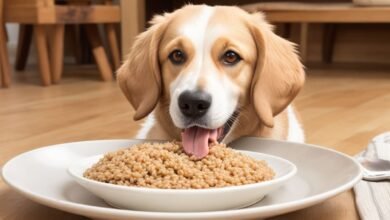Can Your Dog Enjoy Couscous? Benefits and Risks Explained

Welcome to the world of couscous, where we explore not just its culinary appeal for humans but also its emerging role in canine nutrition. In this introduction, we’ll dive into what couscous is, its various types, how it’s traditionally used in human diets, and why it’s gaining attention as a potential food for dogs.
In human diets, couscous is valued for its versatility and nutritional benefits. It’s a good source of carbohydrates, providing sustained energy, and contains moderate amounts of protein and fiber. Rich in vitamins and minerals, couscous supports overall health and well-being.
Recently, there’s been growing interest in couscous as a potential dietary addition for dogs. As more pet owners seek wholesome, grain-based alternatives to traditional dog foods, couscous is being explored for its digestibility and nutrient content. When prepared properly and served in moderation, couscous can offer dogs a source of carbohydrates and some essential nutrients.
Join us as we explore further into the world of couscous, its types, uses in human diets, and its evolving role in canine nutrition. Whether you’re curious about incorporating couscous into your own meals or considering it as a treat for your furry friend, there’s much to discover about this ancient grain’s modern applications.So let’s explore that-can dogs eat Couscous?
Nutritional Benefits of Couscous for Dogs
Couscous offers several nutritional benefits for dogs when included as part of a balanced diet. Here’s a breakdown of its nutritional advantages:
Carbohydrate Content for Energy:
- Energy Source: Couscous is primarily composed of carbohydrates, providing a readily available source of energy for dogs. This is beneficial for maintaining their energy levels throughout the day, especially for active dogs.
- Complex Carbohydrates: The complex carbohydrates in couscous release energy gradually, which helps in sustaining their activity levels without causing spikes in blood sugar.
Protein Contribution for Muscle Maintenance:
- Moderate Protein Content: While not as high as in meat or legumes, couscous contains a moderate amount of protein. Protein is essential for muscle maintenance, repair, and overall body function in dogs.
- Complementing Other Proteins: When combined with lean animal proteins like chicken or fish, couscous can contribute to a balanced amino acid profile in their diet.
Vitamins and Minerals: Potential Health Benefits:
- B Vitamins: Couscous provides B vitamins such as thiamine (B1), niacin (B3), and folate (B9), which play crucial roles in energy metabolism, nerve function, and overall cellular health.
- Minerals: It is a source of minerals like iron, magnesium, phosphorus, and selenium, which support bone health, muscle function, and various metabolic processes in dogs.
Fiber for Digestive Health:
- Digestive Support: Couscous contains dietary fiber, which promotes healthy digestion by supporting regular bowel movements and maintaining gut health.
- Feeling of Fullness: Fiber can help dogs feel full longer, potentially aiding in weight management and preventing overeating.
Incorporating couscous into your dog’s diet can provide these nutritional benefits, contributing to their overall health and well-being. However, it’s crucial to introduce couscous gradually and monitor your dog’s response to ensure they tolerate it well. Always serve couscous plain, without added salt, spices, or seasonings, and consult with your veterinarian before making significant changes to your dog’s diet, especially if they have specific health conditions or dietary restrictions. With proper moderation and consideration of their individual needs, couscous can be a nutritious addition to your dog’s meals.
How Couscous Can Complement Your Dog’s Diet
Couscous can complement your dog’s diet in various ways, offering nutritional diversity and enhancing mealtime enjoyment. Here are some effective ways to incorporate couscous into your dog’s meals:
Using Couscous as a Filler or Supplement to Regular Dog Food:
- Energy Boost: Couscous can serve as a supplemental source of carbohydrates, providing an extra energy boost for active dogs or those needing additional calories.
- Meal Enhancement: Mix cooked couscous with your dog’s regular dry or wet food to add texture and variety to their meals. This can make mealtime more interesting and appetizing for your dog.
Combining with Vegetables and Lean Meats for a Balanced Meal:
- Nutritional Balance: Combine cooked couscous with dog-friendly vegetables such as carrots, green beans, or peas, which provide fiber, vitamins, and minerals. Add lean meats like boiled chicken, turkey, or fish to create a balanced meal rich in protein and essential nutrients.
- Proportion Control: Ensure couscous remains a complementary component rather than the main ingredient. Use it to supplement the nutritional content of your dog’s meal without overshadowing the primary protein source.
Serving Ideas for Incorporating Couscous into Treats or Main Dishes:
- Couscous Treats: Make homemade dog treats using cooked couscous as a base. Mix it with mashed sweet potatoes or pumpkin, then form into small balls or shapes before baking until firm.
- Couscous Main Dishes: Create a special meal by mixing cooked couscous with diced cooked chicken or beef, along with steamed vegetables. Serve this as an occasional treat or as a festive meal option for your dog.
Preparation Tips:
- Plain and Unseasoned: Always prepare couscous plain, without adding salt, spices, butter, or oils, which can be harmful to dogs.
- Portion Control: Adjust the amount of couscous based on your dog’s size, activity level, and dietary needs. Moderation is key to ensuring it complements rather than dominates their diet.
By incorporating couscous into your dog’s diet in these ways, you can provide nutritional variety, enhance their meals with wholesome ingredients, and ensure they enjoy a balanced and flavorful diet. As with any dietary change, monitor your dog’s response and consult with your veterinarian to ensure couscous aligns with their specific nutritional requirements and overall health.
Potential Risks of Feeding Couscous to Dogs
Feeding couscous to dogs can pose certain risks, especially if not introduced or monitored properly. Here are the potential risks associated with feeding couscous to dogs:
Allergies and Intolerances to Wheat or Gluten:
- Gluten Sensitivity: Couscous is made from wheat semolina, which contains gluten. Some dogs may have sensitivities or allergies to gluten, leading to allergic reactions such as itching, skin rashes, or gastrointestinal issues.
- Digestive Upset: Dogs with gluten intolerance may experience symptoms like diarrhea, vomiting, or discomfort after consuming couscous. It’s essential to monitor your dog for any signs of adverse reactions.
Digestive Issues Such as Bloating, Gas, or Diarrhea:
- Difficulty Digesting Grains: Like other grains, couscous contains complex carbohydrates that some dogs may have difficulty digesting, leading to digestive issues such as bloating, gas, or loose stools.
- Moderation and Monitoring: Introduce couscous gradually into your dog’s diet and observe their response closely. If digestive issues occur, consider reducing or eliminating couscous from their meals and consult with your veterinarian for advice.
Risk of Overfeeding and Weight Gain:
- Caloric Content: Couscous is calorie-dense, and overfeeding can contribute to excessive calorie intake, leading to weight gain and potential health problems like obesity.
- Portion Control: Determine appropriate portion sizes based on your dog’s size, activity level, and dietary needs. Couscous should be served in moderation as a supplemental treat rather than a primary component of their diet.
Preventive Measures:
- Consultation with Veterinarian: Before introducing couscous or any new food, consult with your veterinarian, especially if your dog has known allergies, sensitivities, or specific dietary requirements.
- Plain Preparation: Cook couscous plain, without added salt, seasonings, butter, or oils, to minimize the risk of digestive upset or adverse reactions.
- Observation and Adjustment: Monitor your dog’s health and behavior after introducing couscous. Adjust their diet as needed based on their individual response and consult your veterinarian if concerns arise.
By being aware of these potential risks and taking preventive measures, you can safely incorporate couscous into your dog’s diet while ensuring their health and well-being. Always prioritize your dog’s dietary needs and consult with your veterinarian for personalized guidance on nutrition and feeding practices.
Safe Preparation and Serving Guidelines
Ensuring the safe preparation and serving of couscous for dogs is crucial to maintain their health and well-being. Here are the guidelines to follow:
Importance of Plain, Unseasoned Couscous:
- Avoiding Harmful Ingredients: Seasonings, additives, salt, butter, or oils commonly used in couscous preparation for humans can be harmful to dogs. These ingredients may cause digestive upset, pancreatitis, or other health issues.
- Plain Preparation: Cook couscous plain, using water or low-sodium broth without adding any additional flavorings or ingredients. This ensures it remains safe and suitable for your dog’s digestive system.
Cooking Methods to Ensure Couscous is Safe for Dogs:
- Boiling Method: Bring water or broth to a boil, then add couscous and simmer until it absorbs the liquid and becomes tender. Fluff with a fork and allow it to cool before serving to your dog.
- Steaming Method: Use a steamer basket to cook couscous over boiling water until tender. This method retains more nutrients compared to boiling.
- Avoid Microwave-Ready or Seasoned Varieties: Microwave-ready couscous often contains added salts, seasonings, or oils that are unsuitable for dogs. Always opt for plain couscous and prepare it from scratch.
Recommended Portion Sizes Based on Dog’s Size and Dietary Needs:
- Small Dogs (up to 20 lbs): Start with 1-2 tablespoons of cooked couscous per meal.
- Medium Dogs (20-50 lbs): Begin with 2-4 tablespoons of cooked couscous per meal.
- Large Dogs (50+ lbs): Introduce 1/4 to 1/2 cup of cooked couscous per meal.
Adjust portion sizes based on your dog’s individual needs, activity level, and dietary requirements. Couscous should be considered a supplemental treat rather than a primary source of nutrition.
Precautions and Additional Tips:
- Cooling Before Serving: Allow couscous to cool down to room temperature before serving it to your dog to prevent burns and ensure they can comfortably eat it.
- Mixing with Other Ingredients: Combine cooked couscous with lean proteins like boiled chicken or turkey, and dog-friendly vegetables to create a balanced meal.
- Consultation with Veterinarian: Before introducing couscous or any new food, consult with your veterinarian to ensure it aligns with your dog’s specific nutritional needs, health conditions, and dietary restrictions.
By following these safe preparation and serving guidelines, you can incorporate couscous into your dog’s diet as a nutritious and enjoyable addition. Prioritize their health by providing plain, unseasoned couscous in appropriate portions, and monitor their response to ensure they tolerate it well.
Expert Advice and Owner Experiences
Veterinarians generally agree that couscous can be safely incorporated into a dog’s diet when prepared and served appropriately. Here are some insights from veterinary professionals:
- Nutritional Value: It can provide carbohydrates for energy and fiber for digestive health. It also contains some protein and essential vitamins and minerals, contributing to a balanced diet.
- Moderation: Veterinarians emphasize the importance of serving couscous in moderation and as a supplement rather than a primary food source. This helps prevent overfeeding and ensures a balanced nutritional intake.
- Individual Tolerance: Like any new food, It should be introduced gradually to monitor your dog’s tolerance and to watch for any signs of allergic reactions or digestive upset.
Anecdotal Evidence from Dog Owners Who Have Tried Couscous:
Many dog owners have shared positive experiences incorporating their dog’s diet:
- Variety and Palatability: Owners often find that couscous adds variety to their dog’s meals and can be mixed with other ingredients like lean meats and vegetables for added nutrition and flavor.
- Digestive Benefits: Some owners report that their dogs enjoy and experience improved digestion or regular bowel movements after incorporating it into their diet.
- Caution with Allergies: However, some owners have observed allergic reactions or digestive issues in their dogs, highlighting the importance of monitoring and consulting with a veterinarian.
Final Recommendations and Best Practices for Incorporating Couscous into Your Dog’s Diet:
- Consultation with Veterinarian: Before introducing couscous or any new food, consult with your veterinarian. They can provide personalized advice based on your dog’s age, breed, health status, and specific nutritional needs.
- Plain Preparation: Always prepare plain and unseasoned, using water or low-sodium broth. Avoid adding salt, spices, butter, or oils, which can be harmful to dogs.
- Portion Control: Determine appropriate portion sizes based on your dog’s size, activity level, and dietary requirements. Should complement their regular diet without replacing essential nutrients.
- Monitoring and Adjustment: Monitor your dog’s response especially during the initial introduction phase. Watch for any signs of allergic reactions, digestive upset, or changes in behavior.
By following these expert recommendations and considering anecdotal experiences from other dog owners, you can safely incorporate couscous into your dog’s diet as a nutritious addition. Prioritize their health and well-being by maintaining moderation, plain preparation, and regular veterinary guidance.




